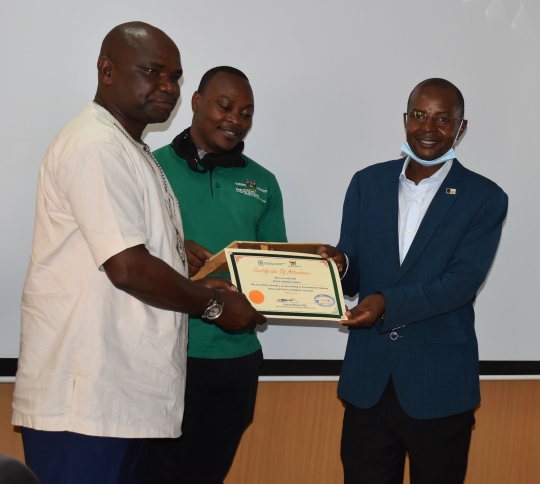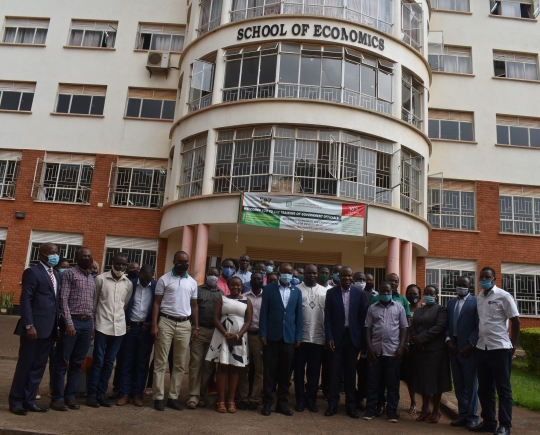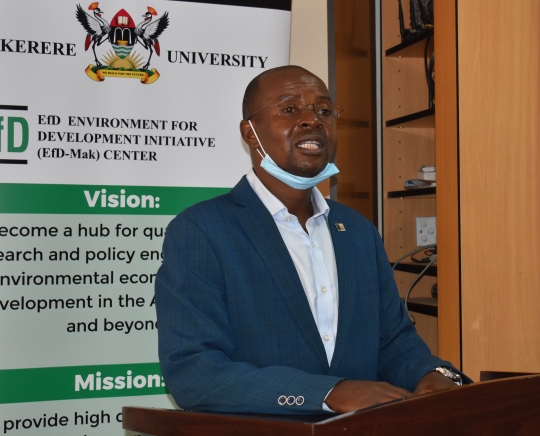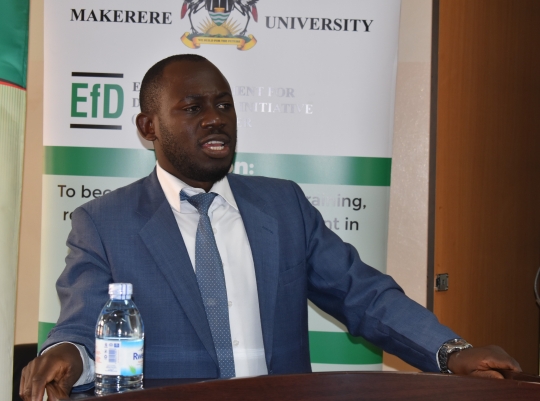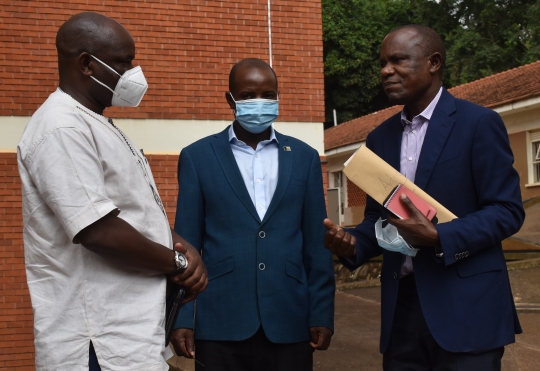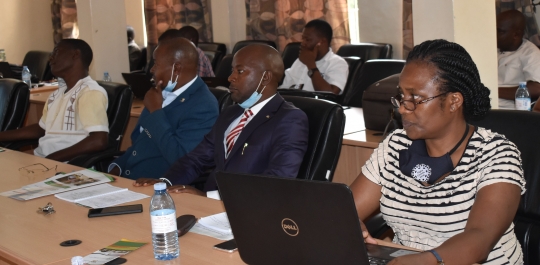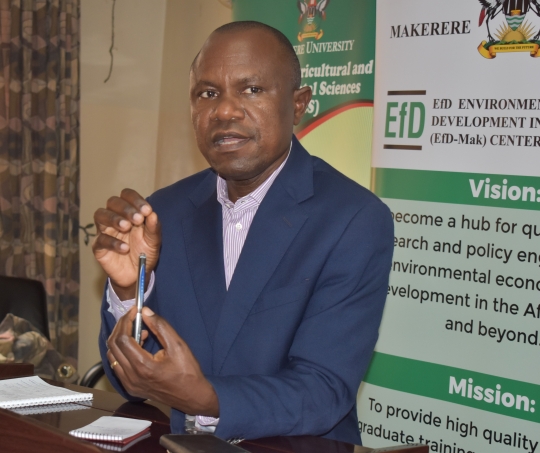Over 40 trainees including representatives from Uganda line Ministries, Departments and Agencies including the Ministry of Lands and Housing, the Ministry of Water and Environment, the National Forest Authority (NFA) the National Environmental Management Authority (NEMA), the Uganda Wildlife Authority (UWA) the National Planning Authority (NPA) and Civil Society Organizations on 10th July 2020 converged at Makerere University for a one day training on Environmental Valuation.The training organized by the Environment for Development Initiative (EfD-Mak) Centre Uganda was also attended by the Member of Parliament Ora County Zombo district Hon. Biyika Lawrence Songa who is the Chairperson of Parliamentary Committee in charge of Climate change.
Speaking during the opening ceremony at the College of Business and Management Sciences (CoBAMS), the Director EfD-Mak Centre Prof. Edward Bbaale said the mandate of this centre is to undertake training, research and policy engagement in the realm of environment and natural resource economics.
Prof. Bbaale said the purpose of training government officials was to equip them with the relevant skills and knowledge in their areas of work, so that they can work better and technically.
“And so as the Environment for Development, we saw it very important that we bring policy makers and train them in key environmental economics skills so that when they are seated either in parliament or their desks in government offices, they can be in position to design policies appropriately and be able to understand what is going on.
For example, Parliament is already embarking on a policy on climate change and we feel that it is our mandate at even that level to train parliamentarians in the area of climate change science, and also climate change economics so that when they are engaging and designing policies, even the language that is going to be used in the design of policy must be technical enough for them to do it appropriately so that it can be comparable internationally,” said Prof. Bbaale.
The centre Director underscored the importance of Environmental Valuation in attaching a monetary value on environmental resources.
“For example, if you are going to convert a forest into a road, what do you depend on for you to make a decision? If you want for example to replace a wetland with a factory, what do you depend on?. If you find that the value of that resource is greater than the value of what you want to replace it with, then don’t tamper with it and so this type of training help to go deeper into those issues”, Prof. Bbaale explained.
Prof. Bbaale said besides training government officials and engagements in policy dialogues, the center’s catchment area ranges from students, researchers, university faculty to build their capacities to successfully do their duty, produce research output, write policy briefs and disseminate to policy makers.
The Director was hopeful that as the centre builds capacities, government will start recruiting into service those knowledgeable people that have trained and continue to re-equip those people with new technics of analysis that have emerged during the time they have gone out of the university.
The lead instructor who is an Assistant Lecturer in the Department of Policy and Development Economics at School of Economics Makerere University (also, a PhD Student University of Nairobi-Kenya) Mr. Peter Babyenda explained that environmental Valuation refers to how a monetary value is put on an environmental resource such as a lake, National Park, a wetland and a forest among others.
Mr. Babyenda however expressed concern that in most cases the value of these natural resources is not known.
“.. and because it is not known, people take it to be free goods and sometimes they don’t value that’s why they keep destroying them for charcoal, for settlement, for houses and others. So today’s training majorly we are training the policy makers, the politicians, the researchers and the graduate students with skills of valuing resources”. Mr. Babyenda said.
The aim of the training according to Mr. Babyenda is to produce capacity. He justified the training in Valuation of Environmental resources for a number of reasons:
The first one is that the Gross Domestic Product (GDP) which does not reflect the destruction of environmental goods because the value of the natural resources is not known.
The second reason for training evaluaters is the litigation cost. He reasoned that if NEMA takes someone to court and then the person is found guilty, the value should be there so that the magistrate just says, you destroyed Mabira forest you should pay this amount of money.
The third reason according to the instructor is that the World Bank is also trying to encourage getting the country’s wealth in not only monetary values but also in the natural resources.
“Another thing is that in most cases these environmental reports only cover economic benefits they don’t talk about the cost we shall lose.
If we look at our National Development Plan III, there is use of green planning. Green planning involves having an open area say in Kampala where people can go, the leisure parks and others. But for it to be able to accommodate this you need to be able to know the value of lets say a park, you need to the value of an open space in town.”. Babyenda said.
Babyenda explained that major aspects emphasized in valuing of environmental resources included a use value (a value which people get by using that resource, for example: a national park or a zoo) and the non-use value ( for example: for a resource like Mabira Forest whether people are aware that it helps generate medicine and attract rainfall) .
He also said the training covered methods of evaluating the non-use value of environmental resources including the travel cost method (how much money does one spend to go to Bwindi impenetrable forest, how much does he spend in the hotel); the hedonic price( looks at the price of rent, how much do you pay for a house in Muyenga, Gaba as opposed to a house in Bwaise where there is no good climate, How much and why Serena or Speke Resort Munyono makes from weddings etc)
“So we also talked about the contingent evaluation method, where you ask people how much they are willing to pay so that Mabira forest remains, how much are you willing to pay so that Bugoma forest remains intact, how much are you willing to pay so that no one touches on Bwindi impenetrable forest.
Then, I have also talked about the new method which has come up, the experiment, where you can put people in an experiment way, you play a game and through those games they are able to tell you the value of the resource.
The Principal, Makerere University College of Business and Management Sciences (CoBAMS) Prof. Eria Hisali welcomed participants to Makerere University and particularly to the CoBAMS thanking them for sparing their valuable time to attend the training when the country is experiencing a partial lock down due the COVID 19 pandemic.
The Principal extended special appreciation to the Director EfD-Mak Centre and his team for keeping the centre active despite the lock down.
“We all know what we are going through as a country and indeed as the old community but this is one of the centres that have kept activity running, so we want to really most sincerely appreciate you.
Honorable Member of Parliament and indeed all the participants we want to thank you that you could accept and come to attend this physically. These days many of the activities are being held scientifically but the mere fact that you could take your time and possibly take some bit of risk to come all the way. We want to appreciate you and we want to thank you”. The Principal appreciated
Elucidating on the three core university mandates- teaching and learning, research and community engagement, Prof. Hisali said, in line with this pillar of community engagements, the college started an initiative at the end of last academic year where each and every school within the college would be required to run at least one flagship activity.
The School of Business he said, has embarked on efforts to establish a centre and grow a centre for entrepreneurship and very soon will be reaching out to startup entrepreneurs to give support.
The Principal said the School of Statistics was working on a centre for better management and analysis that will house issues of better analysis, sampling and design as part of the college contribution to the community.
Prof. Hisali also informed participants that the School of Economics was way ahead of the pack hosting a centre which will be handling issues around macro-economics modeling and trying to forecast and project the performance of Uganda’s economy from the different dimensions.
In the same School of Economics Prof. Hisali reported that there is a centre for Public Investment Management something very unique which we will be looking at Upraisal of Public Investment projects.
The Principal also hailed the School of Economics for hosting the centre for Environment for Development making the university proud.
Commenting on the days training, Prof. Hisali commended the theme and various topics covered as very important and interesting.
The Principal was also impressed by the multidisciplinarity of the trainees from different agencies of government, the political leadership from Parliament, the civil society and the academia adding that this was a very good and rare partnership.
“And therefore my appeal at this point is that this should be a starting point for building a more enduring relationship. Building a team that has a passion for issues around environment and sustainable growth.” He observed.
Prof. Hisali proposed the need for a framework of following up topics that are up for discussion today in the form of research.
“So this should be a point at which we pick the basic concepts and as we discuss these topics each of us should be looking out for the possible research issues that arises from these very important topics and in order to keep the collaboration going, I will be extremely happy if there would be teams that are formed with representation from different institutions. So that the next time we meet for such a training, we start off by getting presentations from these teams on the progress that they will have made over that particular period.
And I believe that our instructor and other experts here in the room will be extremely happy to give guidance as we do this work. We need this coz we seriously need evidence to inform policy making”, Prof. Hisali suggested.
The second issue the Principal suggested was considering forming policy labs around important issues which would entail getting representation from different institutions coming together and brainstorming on topical issues around the environment and sustainable development in this case and come up with a policy brief with input from all different dimensions, the academia, the policy makers in Parliament, the policy implementers in the civil service, the civil society and any other interested members of the public.
“So I think if we follow up on these two important points, the one around research and the one around the policy labs and policy briefs then, we will keep this team working together and we will be able to see more and more results and results that will be actioned into the policy making process”. Prof. Hisali advised.
